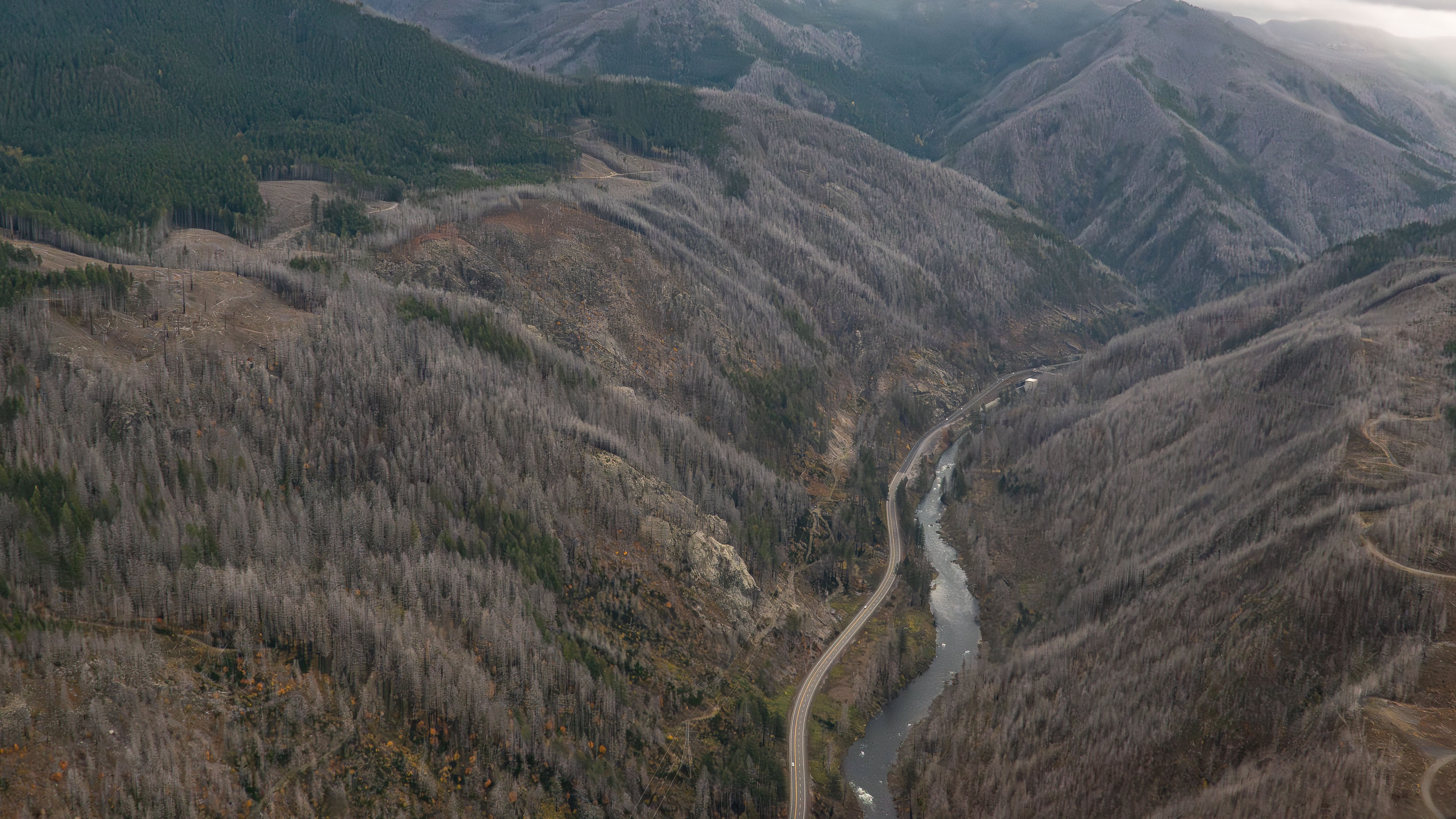This story was produced by the Oregon Journalism Project, a nonprofit newsroom covering the state.
A Multnomah County circuit judge has adopted an ambitious new schedule to speed up a class action lawsuit PacifiCorp faces over Oregon’s 2020 wildfires.
Judge Steffan Alexander approved a new case management order July 28 that will quadruple the number of damages trials by February. The new schedule calls for four damages trials to run simultaneously. His order came over the objections of PacifiCorp, which wanted the trial calendar to remain at the current rate of one case per month.
At one case per month, plaintiffs’ attorneys say, the damages trials could have dragged on for more than a decade.
Alexander is trying to speed the resolution of thousands of cases stemming from wildfires that swept across Oregon five years ago. As the Oregon Journalism Project previously reported, the trials pit PacifiCorp, the state’s second-largest electric utility and a subsidiary of legendary investor Warren Buffet’s Berkshire Hathaway Inc., against rural Oregonians, many of whom lost their homes in the 2020 fires.
The judge’s plans will be complicated by a state court system struggling to keep up with an avalanche of filings. “With about 2,000 plaintiffs and more than 100 attorneys, these cases are having a huge impact on the court,” court official Barb Marcille said.
The court’s electronic filing system has buckled under the load. That has forced court staffers and lawyers to come up with “manual workarounds.” In some cases, lawyers deliver hard copies of filings and staffers must scan each page to get it into the electronic file.
“This process and schedule will require significant judicial and staff resources to manage,” Alexander’s case management order states. “While the trial calendar is ambitious, the court aims to complete the trials as quickly as possible to bring closure to the thousands of families who lost homes and property in the wildfires.”
Alexander’s new case management order is a win for the thousands of Oregonians who have joined the class action. In 2023, a Multnomah County jury found PacifiCorp guilty of gross negligence, recklessness and other charges related to the 2020 fires.
Subsequently, juries have overwhelmingly sided with plaintiffs in the damages trials. On average, juries have awarded individual plaintiffs $5 million apiece.
But all of the big jury awards and favorable rulings won’t mean much to the individual plaintiffs if PacifiCorp can drag out the proceedings. Just 90 of the approximately 2,000 class action members have completed the damages trial phase of the case, said Tim DeJong, a lawyer with Stoll Berne, the Portland firm that represents hundreds of victims. And even then, they have not received any money due to PacifiCorp’s appeals of existing judgments.
Other plaintiffs will never see an award. Attorneys representing the plaintiffs say about 50 of their clients have died in the five years since the class action was filed.
After the initial verdict against PacifiCorp in June 2023, other fire survivors hoped the utility would settle their cases based on that precedent, as other defendants in class action cases have done. But PacifiCorp declined to settle. Instead, it requested damages trials for each of the class’s 2,000 members.
In these cases, PacifiCorp’s attorneys are allowed to probe each of the defendants’ loss claims, their financial situations, even their mental states. Stoll Berne claims one of its elderly clients was grilled about his mental health for seven hours.
The interrogation was an obvious effort to intimidate the plaintiffs, Stoll Berne lawyer Cody Berne told a legislative committee earlier this year. Legislators drafted several bills that would have impacted the case. None made it out of committee.
Alexander’s desire to speed up the resolution of cases is unfair to PacifiCorp, a company official said.
“Proceeding with damages trials on an unprecedented schedule while PacifiCorp’s appeal is pending raises serious due process concerns and departs from established legal norms,” PacifiCorp spokesman Simon Gutierrez said.
“Moreover, the plan proceeds despite a conclusive report from the Oregon Department of Forestry finding that power lines did not cause the Santiam Canyon fire, which affects the majority of plaintiffs in the class being scheduled for trial. PacifiCorp is evaluating all available legal options in response to the ruling.”
Attorneys for the victims have long advocated for more judges to speed up the process. “We really appreciate that the court listened to us and gave us most of what we wanted,” Stoll Berne’s Tim DeJong said.
Wildfires exploded across much of Oregon on Labor Day 2020. Powerful east winds supercharged fires in major river basins flowing westward out of the Cascades. Destructive blazes also took hold near Otis in Lincoln County as well as in Jackson and Klamath counties.
Unlike some other utilities, PacifiCorp did not deenergize its power lines in advance of the fires.
In the first phase of the trial, jurors found PacifiCorp guilty of gross negligence, recklessness and other charges. Now, at PacifiCorp’s request, every individual plaintiff will be subject to a second trial to determine their losses and the damages they suffered.
Class action members have done well in the damages phase of the trial. Stoll Berne has had 90 of its clients go through damages trials. Collectively, the juries awarded them $488 million.
Brian Fitzpatrick, a law professor at Vanderbilt University who has studied class action lawsuits, said it’s not unusual for these cases to drag on. They tend to be complex, high-stakes affairs.
“The typical class settles in three years, so this case is already way beyond that,” Fitzpatrick said.
Usually, it’s around this point in a major class action that defendants look to settle. By now, there has been a sufficient number of individual damages trials to give all the combatants a good idea of their value in the eyes of the jury, Fitzpatrick said, adding: “Maybe they [PacifiCorp] think they can outlast the other side.”
PacifiCorp has said it is eager to resolve the legal claims against it, and reiterated that sentiment in a July 30 statement. The company said it “has settled more than 1,000 wildfire-related claims in Oregon since 2020.”
PacifiCorp added that it is willing to entertain all offers, except for the individuals whose claims stem from the Santiam Canyon blaze: “Due to the compelling findings in the Oregon Department of Forestry report relating to the Beachie Creek/Santiam Canyon fire, the company will continue to actively defend against those claims.”
Correction: this story originally said 300 plaintiffs have completed the damages phase of their trials. The actual number is 90. OJP regrets the error.

